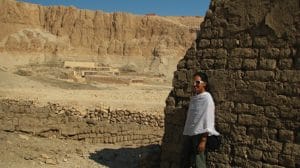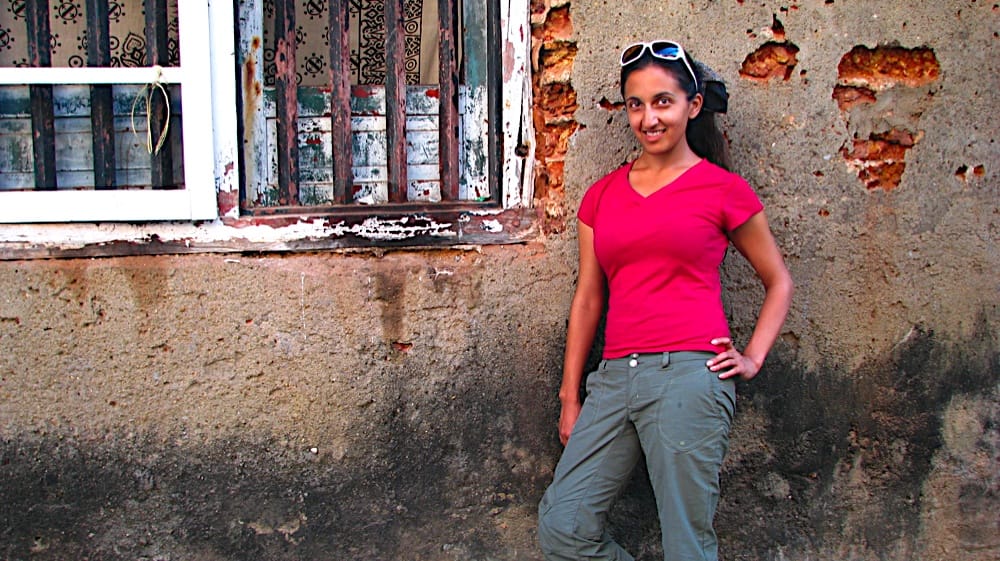Paula Pant is an entrepreneur, writer, speaker, financial consultant, and the person behind Afford Anything. Afford Anything was the winner of the Second Annual Plutus Award for Best New Personal Finance Blog.
I asked Paula to spend some time discussing how her background as a journalist and her family’s emergence from poverty in Nepal over the course of one generation have helped shaped her success.

What was your life like before starting Afford Anything?
I had a normal 9-to-5 desk job. Well, I suppose “normal” isn’t the best adjective: I was a newspaper reporter, which had been my dream for years. I loved the newsroom, loved my colleagues, admired and respected my boss. But I hated being someone else’s employee. I hated needing permission to take a half-day off work. It felt like the grown-up equivalent of asking for a hall pass.
I lived on my base salary of $21,000 annually (which rose to $31,000 by the time I quit), and hustled during the evenings and weekends as a freelance magazine writer. I saved every penny from that side hustle into a travel fund.
In 2008, I quit that job and traveled nonstop for the next two years, backpacking through Europe, the Middle East, South and Southeast Asia, and Australia. I lived entirely on savings, and the total trip cost around $25,000.
What inspired you to create Afford Anything?
My friends kept saying, “I’d love to travel, but I can’t afford it.” Yet these same friends hit the bars, dined at restaurants, lived in nice apartments, drove nice cars, went to concerts, and wore designer jeans. If they really wanted to travel, they could — but they didn’t understand that. They didn’t seem to see the opportunity cost associated with their spend-everything lifestyle.
I wanted to create a blog that could show them that they could afford to pursue any dream, whether it’s traveling, quitting their job, or whatever else. That’s the reason I launched Afford Anything about a year after I returned to the U.S. from that epic trip.
Your family lived in Nepal and migrated to the United States, emerging from poverty just in the last generation. How did your family accomplish this?
Nepal is an impoverished country; the CIA refers to Nepal as one of the “poorest and least developed countries in the world.” It lacks consistent electricity and clean drinking water, its infant mortality is triple the global average, and 42.6 percent of its adult population is illiterate (defined as being age 15 or older but still unable to read or write). Imagine living in a nation where nearly half the adults cannot read or write.
My paternal grandparents were illiterate; neither achieved higher than a 4th grade education. My dad grew up without electricity or indoor plumbing, and his family didn’t have enough money to eat meat. They lived on rice and lentils, and occasionally would treat themselves to chicken on special occasions, like a wedding.
But you need to understand that relative to many people elsewhere in Nepal, that’s still reasonably well-off. Indoor plumbing was a privilege in the 1950s; even today, one of the sharpest problems facing “shantytowns” is the lack of outhouse facilities. Teenage boys tend to congregate at the outhouses, so girls don’t have a safe place to pee.
In Nepal, “rich” vs. “poor” isn’t a matter of shopping at Old Navy vs. thrift stores, or dining at the Olive Garden vs. cooking at home. It’s a matter of survival. I mean that literally; when my dad was born, the average life expectancy in Nepal was 42 (although that’s skewed by our high infant mortality rates).
When survival is at stake, you become laser-focused on improving your life.
My dad knew that his best chance to move to the English-speaking world came through education. He became the first in his family to learn to read and the first in our family to finish the Nepali equivalent of high school. He earned a full scholarship to a four-year college in India, where he earned an engineering degree. He didn’t have the money to bring my mom to campus with him, so they lived apart for four years. (They married at ages 13 and 14.)
He graduated, moved back to Nepal, and applied for a visa to America. He was 21 when he started applying for a visa, and 35 when he was finally granted one. They moved to Pittsburgh when they were 36, where my dad enrolled in graduate school.
He finished grad school around age 40, and that’s when their adult life “officially” began: they rented their first apartment without roommates at that time, and they bought their first car, a beat-up old Ford. The car broke down as my dad drove to his first day at work. Three years later, I was born.

What is the mission or purpose of Afford Anything and how did you decide upon it?
Too many people believe their dreams are out of reach. They think they’ll never be debt-free, never be able to launch their own business, never get to travel the world. In reality, most healthy people living in a first-world nation are capable of doing these things, but they need both the skills and the encouragement. That’s Afford Anything’s mission: to provide those skills and that encouragement.
For a blogger, how does a mission or purpose fit into an overall strategy?
Always keep the interests of your reader ahead of your own. Sometimes that means saying “no” to sponsored post deals or affiliate partners if deep down in your gut you feel like they’re selling an icky product or service. Those types of deals are going to tarnish your content and serve only yourself, rather than your readers.
A purpose-driven blog might not be as profitable in the beginning, when everyone else is feasting on the low-hanging fruit. But it can be more profitable in the long-run, because you’ve earned the trust and respect of your readers.
Many of my current readers tell me that they found me when one of their friends or family members forwarded one of my emails to them. Everything that’s published on my blog gets emailed to my subscribers, in full. That type of word-of-mouth only develops from a long and trusting blogger-reader relationship, one in which you’ve habitually served value to your readers and put your readers’ interests ahead of your own.
In addition to your journalism background and your time spent with Afford Anything, you are a real estate investor. What is your area of focus and how did you get into that field?
I’m ultra-niche: I focus on residential rental property investing. That’s it. No flips, no wholesaling, no warehouses or shopping malls or mobile home parks.
If I wanted to work in real estate full-time, I might explore those venues, but since my optimal outcome is to keep real estate as a passive component of my portfolio, I decided to learn just one niche (residential), one strategy (rentals) and one geographic area (Atlanta), and specialize exclusively in that field. This streamlines the process, helps me make better and faster decisions, and gives me sharper clarity when I’m analyzing a property.
Sure, I’m probably missing opportunities in Charlotte or Minneapolis or Birmingham, but given how passive this enterprise is, I’m fine with that.
How do you use your experiences with real estate investing as inspiration for your online business?
I’m an open book. I share everything on my blog, from the price of the home to the profitability. I cover every topic from strategic thinking (rentals vs. flips) to tactical tips (close the toilet lid when you take photos).
A lot of my writing is geared around debunking myths. “If the rental income covers the mortgage, it’s a good deal” is a myth that I attack over and over. Same goes for “I should buy a rental property even if it doesn’t have strong cash flow, because I’m making an equity appreciation play.”
Many readers email me with real estate questions, and these are often the basis of my articles.

Is your online income just as passive as real estate income?
Goodness no! Online income is active, active, active. I’m writing blog posts at 9 a.m., replying to reader emails at 12 p.m., hiring someone on Odesk to layout and design my new opt-in gift at 2 p.m., researching hosting migration at 4 p.m., checking my Aweber stats at 6 p.m., and responding to interview requests at 8 p.m. Blogging is a ton of work.
I rarely think about real estate, except to write blog posts or respond to reader questions about it. The upfront work of finding and rehabbing a property is a full-time job that can last for weeks or months, but after that’s done, it’s set-it-and-forget-it. Blogs are a different beast; there are always new reader emails in my inbox, comments to approve, more posts to write.
How does your income from Afford Anything break down by category?
Roughly — and these are ballpark figures — about 10% comes from affiliate marketing and display advertising combined; 30% from B2B consulting about online marketing and social media marketing; 50% from freelance article contributions that have arisen as a result of the site; and 10% from coaching and speaking. I’ve intentionally minimized direct advertising on my blog, because most of it doesn’t pass my gut check or my “sleep easy at night” check.
You’re still a frequent and avid traveler. How do you maintain your businesses while traveling?

The operative word is “maintain.” I keep my business chugging along, keeping my current clients happy, but I’m certainly not achieving any additional growth.
During my “default” life, when I’m not traveling, my team of assistants handle a lot of the day-to-day routine. I focus on growing and expanding the top of the funnel; they focus on executing the tasks further down in the funnel. When I travel, I have limited time to work, so I spend that time coordinating, managing and helping my team. I don’t spend any time creating future growth.
With appearances through the national media and speaking engagements, you have created a strong personal brand. What efforts have you made to move that aspect of your business forward?
My brand is all over the place: Travel, launching a business, financial independence, investing, passive income through real estate. I’m a mashup of a lot of different genres and niches, which I pull together under the broad “wealth and lifestyle design” umbrella.
Some people have advised me to zero on one specific niche, like real estate or travel, but I can’t limit myself like that. It’s not in my nature.
During your time as a professional journalist, before you launched Afford Anything, you followed a highly publicized murder investigation. What was that like?
The JonBenet Ramsey murder! Oh man, I’ll never forget this.
JonBenet was a six-year-old beauty queen who was found murdered in her home on Christmas Day 1996. Early suspicion fell on the parents, but there was insufficient evidence to make any arrests. For 10 years, her murder remained an unsolved mystery.
In 2006, a decade after the murder, Boulder police arrest a man named John Mark Karr, who confessed to the killings. Karr was extradited from Thailand, where he lived at the time, and brought to Boulder to face charges.
As you can imagine, the city of Boulder — where I was a reporter — turned into a media circus overnight. Every major news organization was camped in front of the courthouse; helicopters were flying overhead; the entire town was engulfed in this story. I went to the courthouse every day for weeks to cover the arrest.
The tipoff for Karr’s arrest came from a professor at the University of Colorado named Michael Tracey, who heard Karr’s initial confession after 11 phone conversations and a long series of email exchanges. I snagged the first published interview with Tracey after Karr’s arrest, a scoop that was incredibly exciting for the career of a young reporter. CNN called to ask if I’d appear on Greta van Susteren’s show to discuss my interview with Tracey, but our newsroom forbade us from making public comments to other news groups about the Ramsey case.
We published several articles about Tracey and his pivotal link to Karr’s arrest in our paper. I’m convinced Karr would never have been arrested if Tracey hadn’t meticulously documented their correspondence and turned over all the evidence to the police. An envelope that Karr mailed Tracey was crucial to helping Thai police track down his whereabouts in Bangkok.
Despite Karr’s confession, the police ultimately dropped their charges against him due to insufficient evidence. Ramsey’s murder remains unsolved.
What similarities do you see between being the proprietor of a money-generating blog and being a journalist?
Bloggers and journalists both observe and document the world. We notice what people are saying and doing, and shine light on those observations through our writing. As bloggers, though, we can be openly opinionated, while reporters are traditionally advised to reflect the facts without passing commentary.
As a journalist, for example, I might write a story about one or two people who are used the recession as an opportunity to buy an inexpensive rental property. As a blogger, I can build on that story by expressing my opinion — “that’s awesome” — followed by recommendations on how to get started in that industry.
Bloggers have a lot more creative freedom, in that regard.












4 Comments
Stefanie @ The Broke and Beautiful Life · March 23, 2015 at 8:14 am
I’d love to get to that point where I can simply work on maintaining rather than so much on growing. I love growing, but I’d like more freedom to do things like travel and pursue other opportunities.
Paula Pant · March 23, 2015 at 11:05 am
You’ll get there, Stefanie! It’s a journey; enjoy your current place along that road, because you’ll be telling “remember when?” stories about these days in the years to come.
Julie @ The Family CEO · March 24, 2015 at 3:41 pm
Great article! I’ve always been a big fan of yours, Paula. Thanks for continuing to inspire.
Steph · March 28, 2015 at 3:28 pm
Great article and interview with Paula. I’ve been reading her Afford Anything blog for years and I’m always inspired. I continue to learn and get new ideas from her!
Any time someone tells me they “can’t afford it” I always point them to Paula’s blog! 🙂